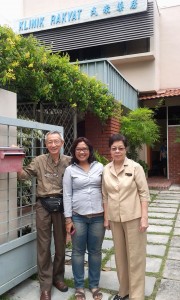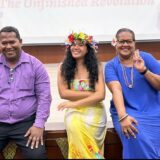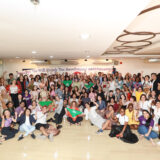Sharing and learning among ASAP members
The Asia Safe Abortion Partnership has members and partners in 15 countries in the Asia Pacific region, and in the Middle East. Abortion laws, attitudes to abortion, access to safe abortion services, and outreach programmes are different in each of these countries, and so all our partners always have plenty to learn and share from each other.
Earlier this month, Inna Hudaya, the director of ASAP’s partner organization Samsara visited Malaysia, where she went to abortion facilities run by ASAP’s partner organization, Reproductive Rights Advocacy Alliance of Malaysia (RRAAM).
Dr. S.P. Choop ASAP Steering Committee Chair, and Co-chair of RRAAM writes about the vist, and about how it presented both organizations a unique opportunity to share information, knowledge and insights on safe abortion and access to the same.
As you may know, Samsara in Jogjakarta is a leading organisation in Indonesia promoting women’s reproductive rights and access to safe abortion. It is one of local initiatives supported by ASAP and Women on Web.

Inna Hudaya , the director of Samsara, was in Malaysia recently, and RRAAM staff arranged for her to visit the Klinik Rakyat at Penang, where she was able to see the outpatient facilities and operational guidelines at the reception, the counseling booths and consultation rooms. Later, she went to the surgical facilities situated in the city centre where abortions were being done by KR staff.
Before she left she gave our staff a brief presentation of her impressions of the Klinik’s service, on the situation in Indonesia and the work of Samsara. She was particularly surprised to see how quick and simple MVA procedures actually are when done under oral sedation and local anaesthesia for early pregnancies. She also noted how stress-free it must have felt for the clients in contrast with the situation in Indonesia. She reckons that the pain relief and stress reduction starts from the point of entry to the clinic — from the receptionist’s friendly greeting to the bed-side care given by the nurses.
RRAAM staff were shocked by several revelations about Indonesia, most of all by the fact that doctors do not give any local anaesthesia for abortion as a form of ‘punishment’ by the fact that even clinic run leading NGOs often reject requests for abortion from Single Women. Thus women are forced to seek services in private clinics where they are forced to pay more.
Samsara was stared 5 years ago as a centre providing post-abortion counseling, but due to demand, they also started pre-abortion counselling, which now forms a major part of their work. They now have 8 staff across all major islands of Indonesia and handle about 100 individual enquiries a month (by phone or email). By special arrangement with a leading local NGO and some private doctors, clients are directed to safe surgical abortion providers as well as given supplies of genuine medical abortion pills. However, providers remain under constant pressure from the authorities and it is believed that the police are regularly paid off to avoid harassment.
RRAAM learned something useful from Samsara. The latter has an exhaustive recording system where clients are given an online questionnaire after their treatment for feedback on effectiveness with the abortion pills, or the suitability of the abortion provider. They hope that this feedback will help them seure international funding for the future.
After two days with RRAAM, Inna went off to enjoy the heritage city of George Town and its culinary delights! She then visited Kualalampur and met some more of RRAAM’s staff before returning to Indonesia.






